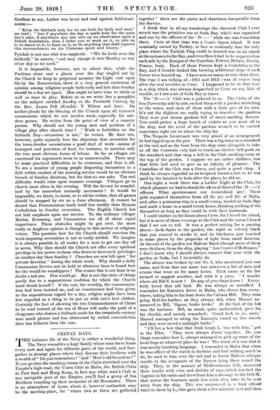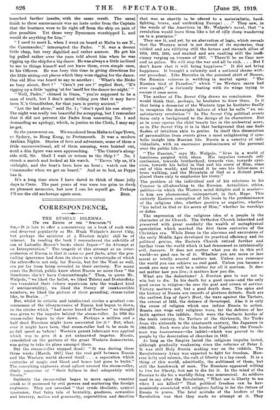CRETAN DAYS.
THE intimate life of the Navy is rather a wonderful thing. The Navy resembles a huge family whose sons leave home every now and again for different parts of the world, and fore- gather in strange places where they discuss their brethren with a wealth of" Do you remembers ? " and " How's old So-and-so ? " If you go into the smoking-rooms of the Clubs stretched over the Empire's high-road, the Union Club at Malta, the British Clubs at Port Said and Hong Kong, in fact any white man's Club in any navigable port of the Empire, you'll find a group of Sea Brethren rounding up their memories of old Messmates. There is an atmosphere of home about it, however outlandish may be the meeting-place, for "where two or three are gathered
together" there are the yarns and cheeriness inseparable from the Service.
I think that in all my wanderings the cheeriest Club I ever struck was the primitive one at Suds Bay, which was organized and run by the officers of the 'D—_' while she was Guardship there. Crete at that time was a Comic Opera island. It was nominally owned by Turkey, in fact so nominally that the only place where the Turkish Flag could be hoisted was on ari island at the entrance to the Bay, and even then it had to be supported on each side by the Ensigns of the Guardian Powers, Britain, Russia, France, Italy. Each of these Powers kept a Guardship in the Bay, and if trouble looked like brewing additional ships of each Power were hurried up. I have seen as many as nine ships there.
The time I am talking of-1911 and 1912—was of course long after the real troubles in Crete. I happened to be at that time in a ship which was always despatched to Crete on any hint of trouble, so I saw a lot of Suda Bay at times.
The ' D—'s ' Club was a godsend to us. The Clubs of the four Powers lay side by side, each of them with a garden stretching to the water, and each of them with a little pier of its own.
It's not the slightest use really trying to describe the gardens They were just dream gardens full of sweet-smelling flowers.
You could gather a huge bunch of violets as you went off to the ship, and the scent of the gardens seemed to be carried sometimes right out to where the ship lay.
The Torpedo Lieutenant was very proud of an arrangement he had rigged up on the pier. There was a big lamp on a standard at the end, and as the boat from the ship came alongside to take us off the Coxswain only had to touch an electric bell-push on the standard and that rang a bell in the Club smoking- room at the top of the garden. I suppose we are rather children, but that little bell used to give us an infinity of pleasure. The Custodian of the Club was a Greco, and quite a good chap. I think he always regarded us as incipient lunatics, but as he was paid by the lunatics to look after the place, he did so.
One night a week there was a Ladies' Night at the Club, for which pleasure we had to thank the wives of three of the officers. 'What sportswomen our womenkind are ! These girls separated themselves from all the joy and life of Malts, and, after a poisonous trip in a small tramp, landed at Suds. Bay and made a home in a small Greek house, thinking nothing of the discomfort as long as they could be with their husbands.
I could blather on for hours about Crete, for I loved the island, but it is more of those evenings at the Club and the yarns I heard that I set out to tell. It was a perfect setting for a yarning séance—deck-chairs in the garden, the night so velvety black that you wanted to stroke it, and its blackness just touched in some places by the pinpricks of light from small lanterns. At the end of the garden our Maltese Band (though most of them were Sicilians) from the ship, playing "Lea Contes d'Hoffmann." I don't know why I should always connect that tune with the garden at Suds, but I invariably do.
The silence was broken by our No. 1, who mentioned just one name, and from that one name was uns-oven a list of men and events that went on for many hours. Each name on the list seemed to suggest another, and with it a yarn. "I wonder where old Bill S. is now ? Do any of you chaps know ? Every- body loved that old bird. He was always so unruffled. I remember his Karozzin driver in Malta, who drove him every- where, taking him to his boat down the Calcara Hill. They were going Hell-for-leather, as they always did, when Manoel an- nounced to Bill, Signor, brake broke.' At the foot of the hill was the harbour. Bill, as usual, quite undisturbed, gave his fat chuckle, and merely remarked : Good luck to ye, mate,' Manoel managed to swing the Karozzin round on two wheels and they were saved a midnight bathe."
"I'll bet a bob that that Irish tough L. was with him," put in the Pilot. "They were always about together. Do you chaps remember how L. always managed to pick up some of the local lingo at whatever place he was ? The worst of it was that it was mostly insulting language. I remember in Malta that when he was officer of the watch in harbour and had nothing much to do, he used to lean over the rail and in fluent Maltese whisper insults to the occupants of the Dysoes lying there round the ship. They, in the manner of Mediterranean folk, answered these insults with cries and shrieks of rage, which reached the Captain in his cabin and drew from him a message to the O.O.W. that unless the boatmen made less noise they were to be sent away from the ship. This was announced in a loud official voice to them by L., who gave them a few minutes' rest and then launched further insults, with the same result. The usual finish to these amusements was an irate order from the Captain that the boatmen were to lie right off from the ship on pain of dire penalties Yet those very Dysoemen worshipped L. and would do anything for him."
"I used to meet L. when I went on board at Malta to see N., the Commander," interrupted the Padre. "N. was a decent little chap, but very dignified and rather austere. He got his leg pulled rather over the yarn told about him when he was rigging up the ship fora big dance. He was always a little inclined to see to things himself and not leave them, even simple ones, to his Officers. He was busy this time in giving directions for the little sitting-out places which they were rigging for the dance. One old Blue was heard to say to another : 'What's the Bloke so busy about, Bert ? " Carn't yer see ?' replied Bert, "E's rigging up a little 'ugging 'ut for 'isself for the dance ter-night.'"
"Well, Padre," chimed in Guns, "you're supposed to be a man of truth, but I don't mind telling you that it may have been N.'s Grandfather, for that yarn is pretty ancient."
"Let the lad alone," said No. 1; "don't spoil his one story." The night was really too beautiful for scrapping, but I remember that it did not prevent the Padre from unseating No. 1 and demanding an apology, which, in justice to the Cloth, I may say he got.
So the yarns went on. We wandered from Malta to Cape Town, to Sydney, to Hong Kong, to Portsmouth It was a modern Arabian Nights. Stories of love and adventure, some of them a little unconventional, all of them amusing, were hoisted out, until a dim figure was seen approaching. "The Cutter's along- side still, Sir. Shall I wait or return to the Ship ? " No. 1 struck a match and looked at his watch. " 'Eaven 'elp us, it's midnight, and the boat's been here an hour ; watch out the Commander when we get on board." And so to bed, as Pepys has it.
It's a long time since I have dared to think of those jolly days in Crete. The past years of war were too grim to dwell on pleasant memories, but now I can let myself go. Perhaps see the old anchorage again soon. Bien.







































 Previous page
Previous page